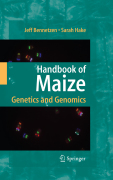
Handbook of maize: genetics and genomics
Maize is one of the world’s highest value crops, with a multibillion dollar annual contribution to agriculture. The great adaptability and high yields available for maize as a food, feed and forage crop have led to its current production on over 140 million hectares worldwide, with acreage continuing to grow at the expense of other crops. In terms of tons of cereal grain produced worldwide, maize has been number one for many years. Moreover, maize is expanding its contribution to non-food uses, including as a major source of ethanol as a fuel additive or fuel alternative in the US. In addition, maize has been at thecenter of the transgenic plant controversy, serving as the first food crop with released transgenic varieties. By 2008, maize will have its genome sequencereleased, providing the sequence of the first average-size plant genome (the four plant genomes that are now sequenced come from unusually tiny genomes) and of the most complex genome sequenced from any organism. Among plant science researchers, maize has the second largest and most productive research community, trailing only the Arabidopsis community in scale and significance. At the applied research and commercial improvement levels, maize has no peers in agriculture, and consists of thousands of contributors worthwhile. A comprehensivebook on the biology of maize has not been published. The Handbook of Maize: the Genetics and Genomics center on the past, present and future of maize as a model for plant science research and crop improvement. The books include brief, focused chapters from the foremost maize experts and feature a succinct collection of informative images representing the maize germplasm collection.
- ISBN: 978-0-387-77862-4
- Editorial: Springer
- Encuadernacion: Cartoné
- Páginas: 800
- Fecha Publicación: 01/03/2009
- Nº Volúmenes: 1
- Idioma: Inglés
